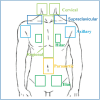ESO-Shanghai 20: phase III clinical trial of anti-PD-1 therapy with local intervention for oligometastatic ESCC
- PMID: 40734507
- PMCID: PMC12344800
- DOI: 10.1080/14796694.2025.2534770
ESO-Shanghai 20: phase III clinical trial of anti-PD-1 therapy with local intervention for oligometastatic ESCC
Abstract
NCT06190782 (ClinicalTrials.gov).
Keywords: Anti-PD-1 immunotherapy; chemo-immunotherapy; esophageal squamous cell carcinoma; oligometastatic carcinoma; radiotherapy.
Plain language summary
Esophageal cancer is a leading cause of cancer deaths globally, with over 500,000 deaths each year, and it is more common in men. Despite improvements in treatment, the five-year survival rate is still low, at less than 20%. Some patients are diagnosed at an advanced stage and cannot receive the best treatment. Studies have shown that using immunotherapy (anti-PD-1 therapy) can improve survival for patients with metastatic esophageal squamous cell carcinoma. However, these studies failed to differentiate between patients with a limited number of metastases, known as oligometastatic, and those with extensive or widespread metastases. Oligometastatic cancer is considered an intermediate stage of cancer development, and some studies suggest that combining local treatment (like surgery or radiation) with systemic treatment (like chemotherapy or checkpoint inhibition therapy) can improve survival for patients with oligometastatic cancer. But there is limited research on this approach for oligometastatic esophageal cancer. Two smaller studies suggested that adding local treatment to systemic treatment might improve survival for patients with oligometastatic esophageal squamous cell carcinoma. To further investigate this, researchers started a larger, multicenter clinical trial called ESO-Shanghai 20. If the results show that combining local treatment with checkpoint inhibition therapy is safe and effective, it could lead to better treatment options for patients with advanced esophageal squamous cell carcinoma.
Conflict of interest statement
The authors have no relevant affiliations or financial involvement with any organization or entity with a financial interest in or financial conflict with the subject matter or materials discussed in the manuscript. This includes employment, consultancies, honoraria, stock ownership or options, expert testimony, grants or patents received or pending, or royalties.
Figures



Similar articles
-
Tislelizumab for the treatment of advanced esophageal squamous cell carcinoma.Future Oncol. 2025 May;21(12):1473-1481. doi: 10.1080/14796694.2025.2495542. Epub 2025 Apr 21. Future Oncol. 2025. PMID: 40257370 Review.
-
Prescription of Controlled Substances: Benefits and Risks.2025 Jul 6. In: StatPearls [Internet]. Treasure Island (FL): StatPearls Publishing; 2025 Jan–. 2025 Jul 6. In: StatPearls [Internet]. Treasure Island (FL): StatPearls Publishing; 2025 Jan–. PMID: 30726003 Free Books & Documents.
-
Systemic treatments for metastatic cutaneous melanoma.Cochrane Database Syst Rev. 2018 Feb 6;2(2):CD011123. doi: 10.1002/14651858.CD011123.pub2. Cochrane Database Syst Rev. 2018. PMID: 29405038 Free PMC article.
-
Impact of first-line chemoimmunotherapy with or without radiotherapy on the prognosis of patients with locally advanced or metastatic esophageal squamous cell carcinoma: a multicenter, real-world, retrospective cohort study from China (NCT06478355).Front Immunol. 2025 Jul 28;16:1633930. doi: 10.3389/fimmu.2025.1633930. eCollection 2025. Front Immunol. 2025. PMID: 40791599 Free PMC article. Clinical Trial.
-
A rapid and systematic review of the clinical effectiveness and cost-effectiveness of paclitaxel, docetaxel, gemcitabine and vinorelbine in non-small-cell lung cancer.Health Technol Assess. 2001;5(32):1-195. doi: 10.3310/hta5320. Health Technol Assess. 2001. PMID: 12065068
References
-
- Doki Y, Ajani J-A, Kato K, et al. Nivolumab combination therapy in advanced esophageal squamous-cell carcinoma. N Engl J Med. 2022;386(5):449–462. doi: 10.1056/NEJMoa2111380 - DOI - PubMed
-
• These three studies investigated the role of anti-PD-1 immunotherapy combined with chemotherapy in first-line treatment of metastatic or recurrent ESCC, demonstrating that anti-PD-1 with chemotherapy significantly improved progression-free survival and overall survival, thus forming the basis for the systemic treatment regimen in ESO-Shanghai20.
Publication types
MeSH terms
Substances
Associated data
LinkOut - more resources
Full Text Sources
Medical
